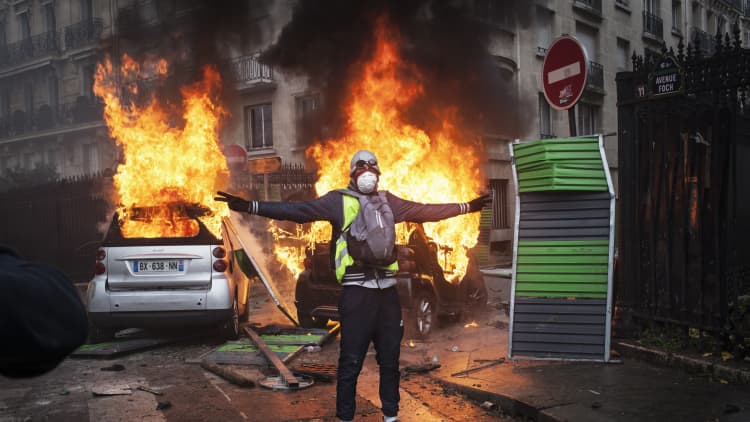
Violent protest in Paris has left analysts contemplating what this could mean for embattled President Emmanuel Macron, amid a resurgence in populist politics ahead of European elections next year.
Images of riots, protests and violence over fuel tax rises in France have gripped the headlines in recent weeks and appeared to come to a head on Saturday.
Thousands of protesters hit the Paris streets with cars being torched, stores being looted and multiple injuries to both protesters and police. Here's what you need to know about the so-called "Yellow Vest" protests and what this means for Macron.
Why are people protesting?
The protests are essentially about recent tax hikes on fuel (gasoline and especially diesel) as part of the government's proposed carbon tax designed to improve its environmental credentials.
The tide of public resentment against the fuel tax rises has swollen into sometimes violent protests. Demonstrators wearing high-visibility jackets have blocked highways and fuel depots and protests have often turned violent. The protests were initially described as a largely working-class, grass roots movement with many among the demonstrators saying their livelihoods will be threatened by higher fuel prices.

However, the protests have now morphed into wider discontent at the high cost of living in France and dissatisfaction with Macron, whose popularity continues to fall. A poll by Kantar Public in late October showed that 71 percent of 1,000 respondents in the poll had no confidence in Macron.
Eurasia Group analyst Charles Lichfield explained that the protests have evolved quickly given the lack of official leadership or structure.
"Web-based expressions of anti-elite resentment have quickly morphed into a physical protest movement." he said in a note late November.
What happened at the weekend?
Following several weekends of protests, tensions came to a head on Saturday when full-scale riots erupted in Paris with scenes described as "urban warfare" and "the worst riots in a generation." The incidents led to the police deploying tear gas and water cannons against protesters. A reported 133 people were injured (including police officers) and 412 arrested.
France's Interior Ministry said it had deployed 37,000 police officers, 30,000 gendarmes (a branch of France's armed forces placed under the jurisdiction of the Interior Ministry) and over 30,000 firefighters to deal with the riots on December 1.
What could happen next?
Macron has ordered his prime minister to hold talks with the leaders of the "Yellow Vests" movement after the violence. He said on Twitter that he will "always respect the protest, I will always listen to the opposition but I will never accept the violence."
Eurasia Group's analyst Lichfield noted that the government is very likely to stick to its new carbon tax rates, despite the resilience of the high-viz jacket movement.
"Following the resignation of Environment Minister Nicolas Hulot, it cannot afford to lose the support of green-minded voters ahead of the EU Parliament elections in May. It could show more flexibility on how it allocates the revenue from the tax by increasing its proposed subsidy to low-income motorists or directing more funds to transport in rural areas," he said, before Saturday's combustive protest.

The French protests seem to be inspiring others in Europe with copycat riots in Belgium this weekend. Famke Krumbmuller, partner and head of political risk at OpenCitiz, told CNBC that the disgruntlement of protesters in France could be felt elsewhere in Europe.
"I guess what's specific to this movement is that it is relatively apolitical, so they (the protesters) are not from just one party on the left or right. They're white, middle-class people that are squeezed by the welfare state. They pay a lot of taxes but they don't get a lot of benefits in return," she told CNBC's Julianna Tatelbaum in Paris.
"And I guess if there are other people in other European counties that face these same challenges then obviously it could become a bigger movement."
She also noted that the majority of Yellow Vest protesters were not violent. "Ultimately, it's not a violent movement but the government now is really under pressure to act," she said.
Is Macron in trouble?
If anti-Macron slogans daubed on the Arc de Triomphe, one of Paris' most famous landmarks, are anything to go by, they show that the protests are about more than just fuel and are reflecting a wider dissatisfaction with his leadership, his reforms and the economy.
Seen as aloof and well-off and representing the elite, Macron has seen his approval ratings continue to fall. That could be a sign of bad things to come for his party, La République En Marche, at the European Parliament elections in May 2019 and questions over his leadership at home — especially with the far-right Rassemblement National (the re-branded National Front) remaining a threat.
"To regain popularity in the short term, the government has few options other than re-emphasizing how cuts to income and council/housing taxes in the 2018 and 2019 budgets should help households," Lichfield noted adding that tackling unemployment remains a key priority.
"The unemployment rate will remain the key indicator of Macron's popularity going forward … The overall unemployment rate is still stubbornly close to 10 percent (and) this will need to fall significantly in 2020-2021 for Macron to reverse his decline in the polls and make himself unassailable in the 2022 election cycle."
Krumbmuller from OpenCitiz said that pressure on Macron could threaten his reform agenda.
"If (Macron) is under increasing pressure like he is now he might reconsider (his reform plans). I don't think this is at stake immediately, but if the pressure continues to be high ultimately that will be at stake."


